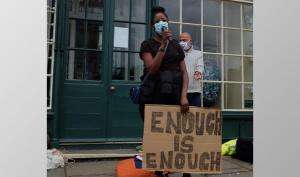We spend all our time 'fitting in', but now it's time to speak out against racism

Professional Social Work magazine - 10 June
After centuries of repression, suppression and oppression, there is something terrifying about speaking out.
You spend all your time fitting in and blending in and doing everything you can not to upset anyone. You avoid sticking your head above the parapet because you fear that people will shun you. They might distance themselves from you because maybe they think your genuine concerns and feelings are nothing and you're “playing the race card” (what even is that?) and that they might be accused of racism. Somehow that accusation has become more offensive than racism itself.
So you avoid speaking out, all your life you avoid it. Then something happens that just floors you. Lots of things have happened over the years, most of which were never filmed. This time it was filmed and you watch it, which you wouldn’t normally have done.
It lights a fire in your soul and finally you are done. You are tired. You speak your mind because hearing a grown man calling out for his mama with his dying breath has made it personal. You refuse to standby and watch as the world - which has stayed this way for hundreds of years and has allowed thousands of mothers to lose their sons and daughters in this way - expresses horror for five minutes, only to settle back into normality until the next video pops up. This world is the same world you inhabit with your black child.
So you figuratively or literally take the mic and speak out with unfiltered emotion... and somehow, rather than feel a sense of pride, relief and catharsis, you worry about what people will think and if you’ll still be one of them.
John Boyega spoke out with equal vitriol and said: “I don’t know if I will have a career after this." It is a damning indictment of humans when speaking out against atrocities makes you feel more vulnerable and for most, prevents you from doing it at all.
I feel more emboldened to politely challenge assumptions, especially when I know that others will see it too and call it out, whether or not they look like me or have personally felt my pain.
I am so grateful for my group of people, friends and allies, navigating through this uprising alongside me, legitimising and validating my feelings. They are helping me to decondition from the damaging self-doubt by confirming that how I feel is valid, especially when everywhere you look, there are people downplaying your struggle or not ready to understand or acknowledge it, or worse still, perpetrating it.
I love that despite all this, I do not feel like a victim and I am filled with hope that I CAN make a difference.
There is nothing quite as valuable in life as hope and although speaking out terrified me, I will do anything to give hope to my son’s generation, whatever their race, and that is all that matters.
This article is published by Professional Social work magazine which provides a platform for a range of perspectives across the social work sector. It does not necessarily reflect the views of the British Association of Social Workers.
